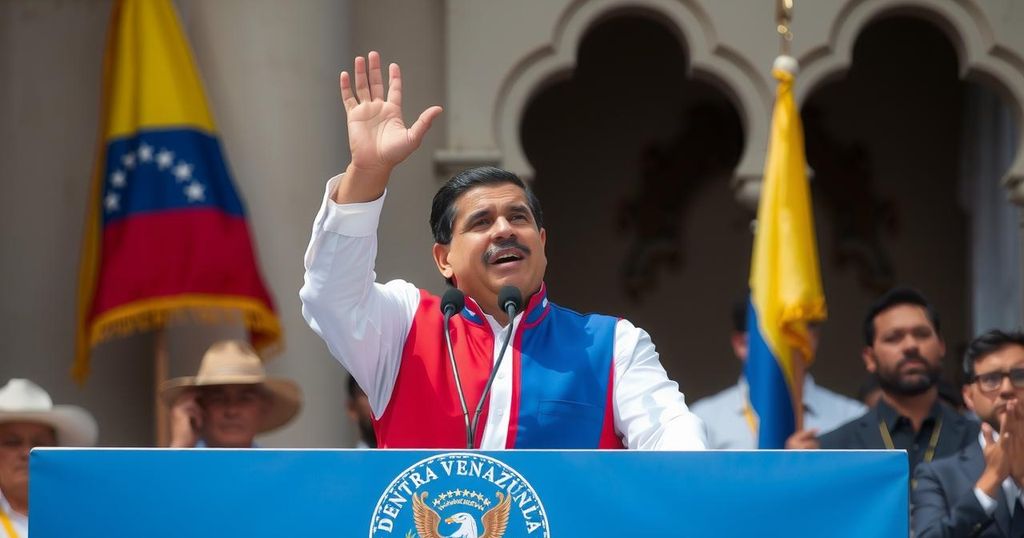World news
AMERICA, ARGENTINA, ASIA, BRAZIL, COLOMBIA, CORRUPTION, CUBA, DEMOCRACY, DONALD TRUMP, ECUADOR, JOE BIDEN, LATIN AMERICA, MADURO, MEXICO, MIGUEL DÍAZ - CANEL, MIGUEL DIAZ - CANEL, NORTH AMERICA, PANAMA, PERU, PHILIPPINES, POLITICS, SOUTH AMERICA, THE WASHINGTON POST, TRADE RELATIONS, UNITED STATES, VENEZUELA, WASHINGTON, WASHINGTON OFFICE, WASHINGTON POST
Sofia Rodriguez
0 Comments
Venezuela’s Maduro Inaugurated Amidst Allegations of Electoral Fraud
Nicolás Maduro was sworn in for a third term as Venezuela’s president, claiming victory amid allegations of electoral fraud. The opposition, led by González, asserts they won the election, backed by evidence and international support. The situation poses a significant threat to democracy in Latin America, with heightened tensions surrounding Maduro’s regime and the response of the international community.
On Friday, Nicolás Maduro commenced his third presidential term in Venezuela, further entrenching his authoritarian regime amid allegations of electoral misconduct. His claim to victory has been met with skepticism, as opposition evidence suggests his rival, González, won decisively. The election has been characterized by some experts as one of the most significant instances of electoral fraud in recent Latin American history, with independent observers validating the opposition’s evidence.
Observers have raised alarms about Maduro’s actions setting a troubling precedent for democracy in the region. Carolina Jiménez Sandoval of the Washington Office on Latin America indicated that Maduro’s disregard for the will of the Venezuelan people poses a significant threat to democratic governance across Latin America. In stark contrast, the international community, including the United States, recognizes González as the legitimate president-elect, with calls from multiple Latin American leaders for a transition in power.
As Maduro took the oath of office, he faced heightened tensions illustrated by the Venezuelan government’s border closures and military escalations in preparation for the event. While the ceremony included a limited diplomatic presence, many certain leaders boycotted the event, indicating disapproval of the proceedings. Notably, Biden’s administration faces a strategic decision on how to engage with Venezuela’s political situation going forward. Discussions on past sanctions have raised concerns about their efficacy, with many calling for a renewed approach to U.S. foreign policy in the region.
The political landscape in Venezuela has been tumultuous since Nicolás Maduro succeeded Hugo Chávez. Maduro’s administration has been marred by allegations of human rights abuses, economic mismanagement, and democratic backsliding. The legitimacy of the electoral process has consistently been questioned, notably during the recent presidential election where the opposition presented evidence of widespread fraud. The divide between those who support Maduro and those who back the opposition reflects almost a decade of political instability that has led to significant social and economic challenges within the nation. As the international community grapples with the legitimacy of Maduro’s government versus the opposition led by González, the implications extend beyond Venezuela, affecting regional dynamics and U.S. foreign policy.
In summary, Nicolás Maduro’s inauguration for a third term presents a significant crisis of legitimacy both domestically and internationally. Amidst allegations of electoral fraud and the opposition’s demonstration of considerable support for González, Maduro’s regime appears increasingly isolated. The evolving crisis raises critical questions about the democracy and political stability in Venezuela, as well as the potential paths forward for U.S. policy and international relations in Latin America. The urgent challenge remains how to effectively support legitimate democratic processes while addressing the complexities of a government that has become notorious for its oppressive measures.
Original Source: www.washingtonpost.com




Post Comment